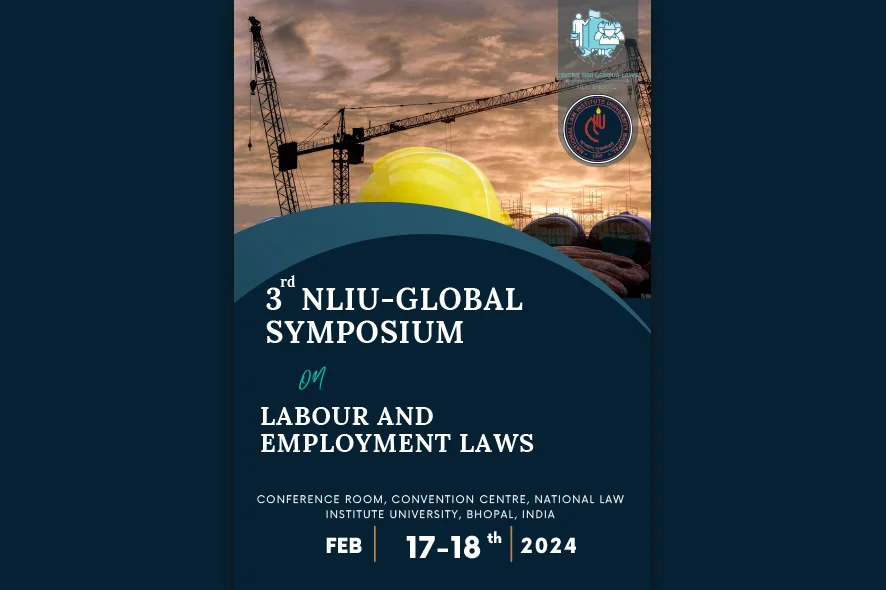Introduction
The National Law Institute University (NLIU) is a law school and centre for research located in Bhopal, India. Established in 1997 by the state of Madhya Pradesh, it is one of the first three law schools to have been established under the National Law School System.
Centre for Labour Laws would host the third edition of Global Symposium (GSLEL) that would comprehensively discuss key issues and new developments in the field of Labour and Employment Laws in the National as well as international arena. This symposium will be the third edition of the event and shall witness participation from experts and paper presenters from across the world.
Symposium Objective
The overall objective of the symposium is to provide a platform and stimulate discussion on issues surrounding Labour and Employment Laws.
Date and Venue
The symposium will be organised on 17th — 18th February, 2024 at the J.S.Verma Convention Centre, National Law Institute University, Bhopal, India in offline mode only.
Eligibility
GSLEL will provide an opportunity for students from undergraduate, post graduate and doctoral qualification, academics and scholars, practitioners, consultants, researchers, and policy makers from different backgrounds across the world, to present their papers in the symposium.
Theme
Key Issues and Recent Trends in the field of Labour and Employment Law
Sub-Themes
-
Challenges to enforcement of Labour Policy and Law
-
International Labour standards and their implementation in India
-
Changing paradigms of Employment Relations
-
Trade Unions and their role in management of Industrial Relations
-
The exploitation of Contract Workers and protection under the law
-
Prohibition of Child Labour
-
Rights of Workers in Unorganised Sectors
-
Prevailing Gender Disparity and Inequalities at Workplace
-
Rights of Workers in Post-COVID Era: Challenges & Prospects
-
New Labour Law Codes and their implementation
-
Gig workers, Platform Workers and protection of labour laws
-
Efficiency of Labour Enforcement Machinery in India
-
Fixed Term Employment and related legal intricacies
-
Occupational Safety and Health — Challenges and Solutions
-
Contemporary debate on validity of Moonlighting in India
NOTE: The author(s) are allowed to choose any sub-theme from the sub-themes specified above and are also free to choose any other theme, which relates to the central theme of the Symposium.
Timeline
-
Call for abstracts: 18 January 2024
-
Last Date for Abstract Submission: 28 January 2024
-
Abstract Selection: 30 January 2024
-
Last date for Submission of Manuscript: 7 February 2024
-
Final Selection for Presentation: 9 February 2024
-
Last Date for Registration and Payment: 11 February 2024
-
Symposium: 17 – 18 February 2024
Submission Categories
Papers can be submitted under the following categories:
-
Long Articles: Between 5000 and 8000 words. Papers in this category are expected to engage with the theme comprehensively and offer an innovative reassessment of the current understanding of that theme. For a long article, co-authorship of upto two authors is permitted.
-
Essays: Between 3000 and 5000 words. Essays are expected to be far more concise in scope. These papers are usually meant to deal with a very specific issue and argue that the issue must be conceptualized differently. They should be more engaging, and make a more easily identifiable, concrete argument. For Essays, co-authorship of upto two authors is permitted.
-
Case Notes and Legislative Comments: Between 1500 and 2500 words. These are analyses of any contemporary judicial pronouncement or a new piece of legislation/rules/consultation papers whether in India or elsewhere. The note must identify and examine the line of cases through which the decision in the question came about, and comment on implications for the evolution of that branch of law. In the case of legislative comment, the note must analyse the objective of the legislation and the legal impact the same is expected to have. Co-authorship is not permitted for this category.
Registration and Payment
-
Registration
After the final selection of the paper, the authors/ co-authors will be required to fulfil the registration process by filling the registration form and paying the registration fees. The registration form will be sent to the authors of the selected manuscripts via email.
Registration fee includes the expenses for participation in the symposium, publication of the contribution, symposium attendance certificates, lunch during symposium, symposium bag and symposium accessories.
-
Payment
Upon submission of the registration form, the participants can pay their registration fee by PayPal, Google pay or Debit/Credit Card. The registration fees is to be submitted only by authors whose final papers have been selected for presentation in symposium. The amount of fee to be paid by each author are as follows:
-
For Academicians, Professionals and PHD Scholars (Indian): INR 1500 per author
-
For Students enrolled in undergraduate or post graduate programme (Indian): INR 1200 per author
-
For Foreign Authors: USD 75 per author.
-
-
Submission Guidelines
-
An abstract/proposal between 300 to 500 words, clearly summarising the arguments, should be submitted through the online Abstract Submission Form. The abstract must also include 3 to 5 keywords. The file should be titled as: “Abstract_(Name of the Article)”. Link to the abstract submission form: https://forms.gle/w7rCFVaq9nT4VqfY9
-
The manuscript should be on A4 sized paper in MS Word, typewritten in British English using Times New Roman, font size 12, 1.5 line Spacing, justified and 1-inch margins on each side. Footnotes should be in font size 10 and with single line spacing. All pages of the manuscript (including Tables and Figures) must be numbered. Submissions made only in the .doc format (word file) will be accepted. The manuscript or the abstract must not contain any personal details of the author.
-
The Authors should conform to the OSCOLA (Oxford Standard for the Citation of Legal Authorities) Citing and Reference Style.
In case of any queries, mail us on gslel@nliu.ac.in
To know more click on CLL Symposium 2024







